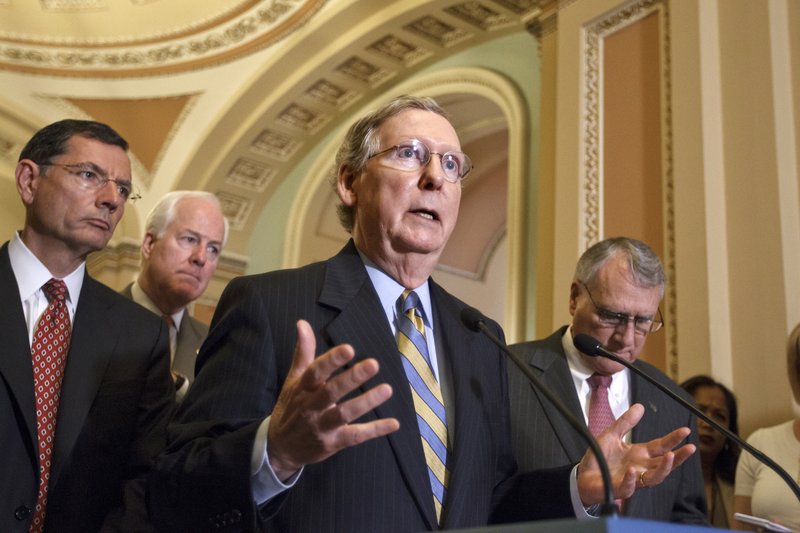WASHINGTON – In a political gamble that will reverberate through the November campaigns, the Senate approved President Barack Obama’s plan to give tax breaks to all but the top 2 percent of American taxpayers over the objection of Republicans.
Democrats believe Wednesday’s action will shift the debate in a Congress that has been stalemated by partisan inaction, giving momentum to Obama’s proposal — and drawing a contrast with Mitt Romney, the Republican presidential candidate — by sending it to the GOP-led House. The Senate approved the measure 51-48, with two Democrats joining the solid Republican opposition.
Failure by Congress to extend the tax rates from the George W. Bush administration would result in a tax increase on ordinary Americans, a prospect that poses enormous risk for both parties.
At the same time, Democrats rejected a Republican proposal Wednesday, 45-54, to extend the tax cuts for all Americans. Two Republicans, Scott Brown of Massachusetts and Susan Collins of Maine, crossed party lines to oppose the measure; one Democrat, Sen. Mark Pryor of Arkansas, joined the GOP.
Emphasizing the importance of Wednesday’s vote, Vice President Joe Biden made an unusual appearance in the Senate to preside over the session, which provoked a spirited debate between party leaders in the usually cordial chamber.
“Republicans should not force middle-class families off their fiscal cliff to protect more wasteful giveaways to millionaires and billionaires,” said Senate Majority Leader Harry Reid, D-Nev. “We’re on the side of the American people.”
Kentucky Sen. Mitch McConnell, the Republican leader, noting the presence of Biden, reminded the chamber that he and the vice president negotiated the 2010 deal that extended the then-expiring Bush tax rates for two more years — until this December.
McConnell said that Biden, who under Senate rules was unable to engage in debate, should be “grateful” he does not have to explain the difference in the White House’s position then and now.
“This is a debate I don’t think you would want to lead,” McConnell said.
Democrats had been reluctant in 2010 to raise taxes on the wealthy, but many Democrats had buyers’ remorse over the deal they cut and the party is playing hardball this year on the tax issue.
Senate passage of the tax measure now puts pressure on the House, where Speaker John Boehner, R-Ohio, has set votes next week on the GOP proposal.
Obama wants to preserve tax rates at their current levels for most Americans, but raise rates on the wealthiest, setting the threshold at $200,000 a year for individuals and $250,000 for couples. The top bracket would rise from 35 percent to 39.6 percent.
The Democratic plan would also boost rates on capital gains and dividends to 20 percent from 15 percent on those above the threshold, and allow the estate tax to revert to its 2001 level of a 55 percent tax rate on inheritances, with an exemption of the first $1 million.
Keeping those tax rates low for the upper-income earners, as Republicans prefer, would add another $1 trillion to the deficit over the next decade.
Republicans are fighting for the tax breaks for the wealthy because they say business owners would be especially hit by a rate hike on the top earners. Nearly 1 million taxpayers, about 2 percent of those who file as corporations and have income above the threshold, would be hit, according to tax analysts.
Under the Republican plan, certain tax breaks for middle and lower-income earners that were first approved as part of Obama’s economic recovery program in 2009 would be dropped.
Republicans say those tax breaks for college costs and tax refunds for the working poor have not helped to stimulate the economy, and should be discontinued. Neither the House or Senate bills are expected to become law, but will be starting points for negotiations after the election — in the weeks before the tax cuts expire.
Send questions/comments to the editors.



Success. Please wait for the page to reload. If the page does not reload within 5 seconds, please refresh the page.
Enter your email and password to access comments.
Hi, to comment on stories you must . This profile is in addition to your subscription and website login.
Already have a commenting profile? .
Invalid username/password.
Please check your email to confirm and complete your registration.
Only subscribers are eligible to post comments. Please subscribe or login first for digital access. Here’s why.
Use the form below to reset your password. When you've submitted your account email, we will send an email with a reset code.